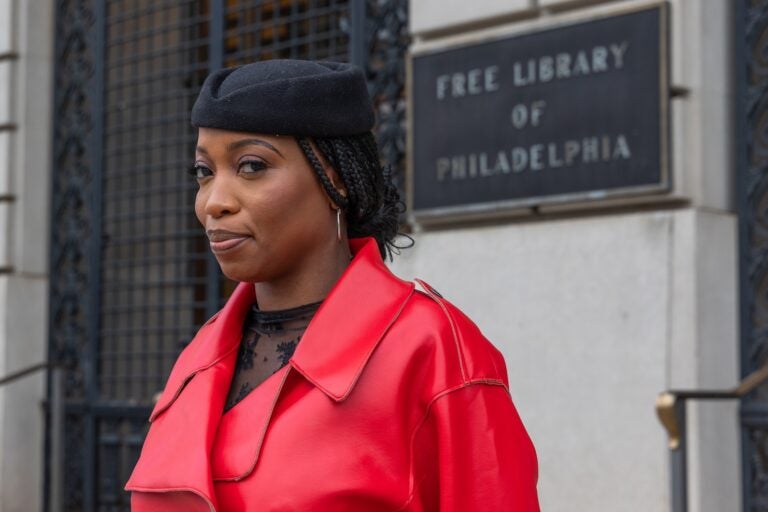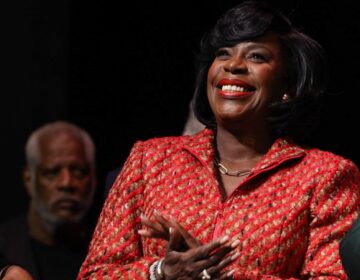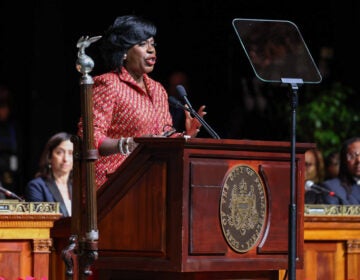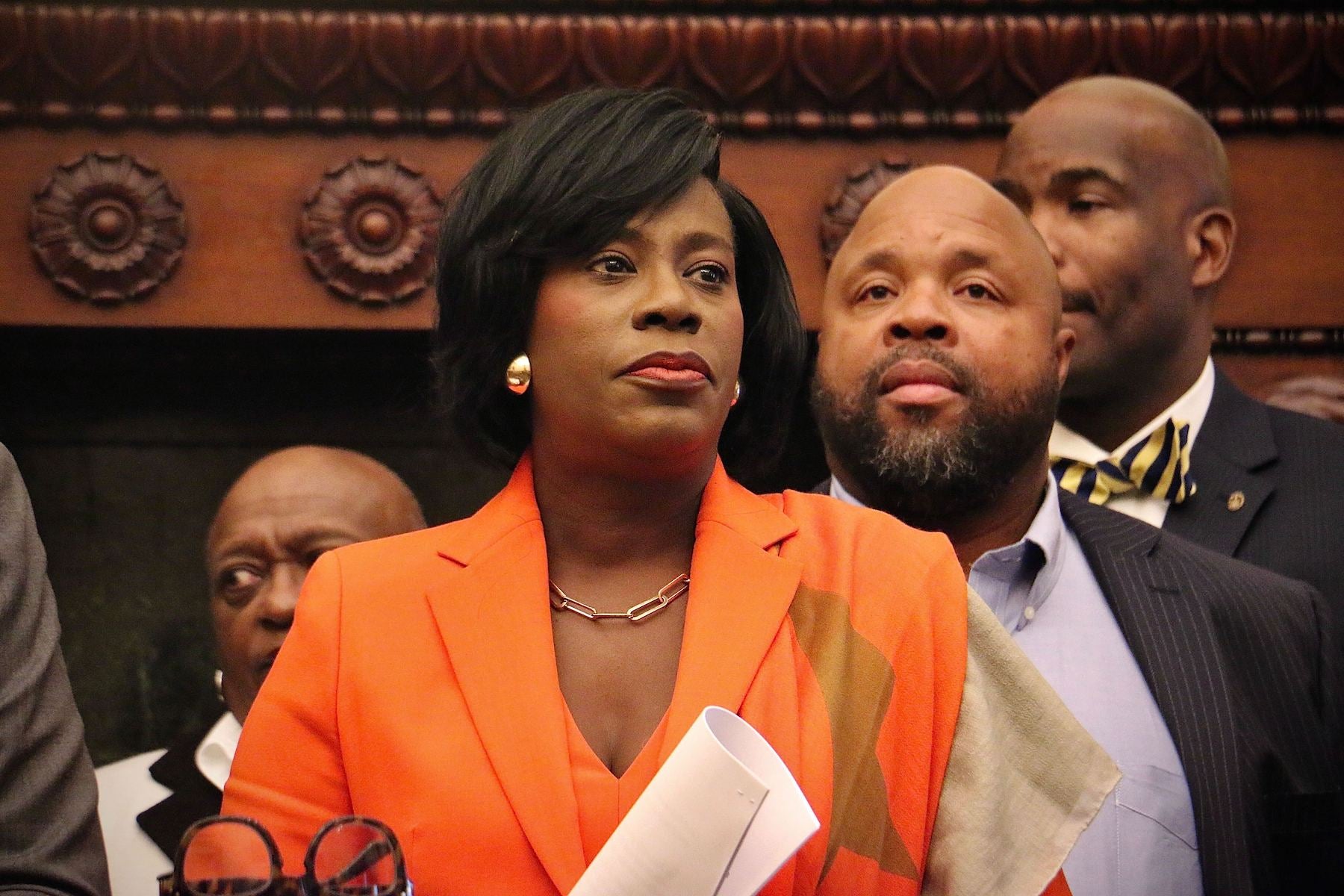Some Philly women in business say ‘now is the time’ for change under Mayor Cherelle Parker
Parker is taking the helm as the first woman and the first Black woman to lead the city of Philadelphia.
Listen 1:58
Jeannine Cook, of Harriett's Bookshop. (Kimberly Paynter/WHYY)
From Philly and the Pa. suburbs to South Jersey and Delaware, what would you like WHYY News to cover? Let us know!
Walk into Harriett’s Bookshop in Fishtown and you might get a chance to meet Jeannine A. Cook, a business owner with deep Philadelphia roots.
“It’s our way of both celebrating women and culture and literature and our heritage. Making sure that books stay a relevant part of today’s conversation,” Cook said about her bookstores, named after Harriet Tubman, Ida B. Wells, Josephine Baker, and Toni Morrison.
While those women are known as key figures in Black American history, a new chapter is forming in Philadelphia as Mayor Cherelle Parker assumes office as the city’s first woman and first Black woman mayor.
While it’s unclear what that might entail, some Philly entrepreneurs and business leaders say there are some clues.
“We know that [Parker] has created programming that didn’t exist, which means she has an eye for innovation,” Cook said. “We’ve never seen what happens with Philadelphia in the hands of a Black woman. We have no idea what it will look like. How that’s going to challenge us as a city. How it’s going to evolve us. We have no frame of reference for it yet.”
Stephanie Rawlings-Blake knows what it’s like to lead as the mayor of a sizable city.Sshe served as the mayor of Baltimore several years ago after her tenure on city council.
Rawlings-Blake is now the executive director of the National Basketball Players Association Foundation.
“I was very focused on doing a better job than my predecessors,” she said. “Baltimore like many cities had suffered from a waning population. I thought by focusing on growth, in order for the city to grow I would have to be successful in things that families cared about and that’s what I focused on. Making our schools stronger, our streets safer and having a healthier city overall.”
It wasn’t easy, and the city still struggles in some ways, but Rawlings-Blake says that success should be defined by an individual, not just popular opinion.
“I think if you want to be a visionary leader and make change you have to do that with your own moral compass,” she said.
Parker has already gathered dozens of business executives to help her during the transition period. The large group was split up into committees and offered advice about what’s possible through collaboration.
“There’s a lot of great things that can be accomplished here,” said Leslie Smallwood-Lewis, chief operating officer and co-founder of Mosaic Development Partners JV LLC. “I’m hoping that she really pushes the envelope, that she’s okay with ruffling some feathers because not everybody’s gonna see it that way, or want it that way, because we’re old school. But for a city to advance we do need to think beyond and above what we’re currently doing.”
Smallwood-Lewis said that overall she’s inspired by Parker’s energy and optimism.
“I think we need that. It’s been several years now where that’s been lacking. She’s got a fresh look and outlook for the city, which I think we all really need that boost right now,” she said.
That sentiment was shared by Tiffany Wilson, president and CEO of the Science Center.
“I think we’re just getting started,” Wilson said. “New mayor, new governor, a new day in greater Philadelphia and across the Commonwealth. As business leaders in the community we kind of have a choice to like step up and step into it and try and make a difference or not. But now is the time. If we can’t do it now in Philadelphia, I don’t know when we can do it.”
Still, none of these women said they were expecting miracles or perfection.
“No one will be perfect, situations will arise and people will stumble, they’ll learn on the job,” said Jami Wintz McKeon, chair of Morgan, Lewis & Bockius LLP. “For the city of Philadelphia to elect a Black woman mayor at this time is a signal that the city is ready for growth. Ready for change. The mayor comes into her job with a lot of goodwill, a lot of positive attitude, and a lot of people who want to help.”
Parker’s election means mixed emotions of hope and worry for some, particularly in a political climate that’s hostile to women’s rights.
“A lot of us have been around for the past four or five [mayors] so we understand what it means to be in that office. So we understand the task at hand. It is an excitement but let me also say there’s a nervousness,” said Joann Bell, convener of the Black Women’s Leadership Council in Philadelphia.
Bell said that, unfortunately, women are sometimes only offered the opportunity to take charge when it’s a difficult task.
“A woman gets it when it’s all broke down and then we have to fix it. But throughout the history of my life there’s always been women there. They just never get the credit,” Bell said. “Now we’re going to see a woman mayor that is action oriented with a can-do spirit.”
University of Florida Political Science professor Dr. Sharon D. Wright Austin said that in most communities where Black politicians are elected, it’s not always a coveted job.
“In some cases Black female mayors are elected in cities that experience a lot of economic decline,” Wright Austin said. They’ve gotten a prize but it’s a hollow prize in the sense that they inherited a city that has a lot of problems.”
Cook, the bookshop owner, said she’ll be watching not just the beginning of Parker’s tenure but keeping tabs on whether or not Parker follows through with her campaign promises.
“It goes back to accountability. If Parker, being the CEO of Philadelphia, were the CEO of a private company, there are bottom line benchmarks to keep the job. The difference in politics is that those benchmarks don’t necessarily have to be met to continue in your job. You still get to play out the rest of your term no matter how good or bad you are.”

Get daily updates from WHYY News!
WHYY is your source for fact-based, in-depth journalism and information. As a nonprofit organization, we rely on financial support from readers like you. Please give today.






